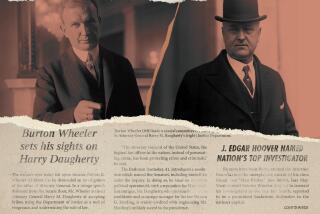THE IRAN-CONTRA HEARINGS : Excerpts: ‘ . . . I Think the Interests of the United States Were Damaged Overall’
- Share via
\o7 WASHINGTON\f7 — Following are excerpts from testimony Monday by Defense Secretary Caspar W. Weinberger before the congressional committees investigating the Iran-contra affair. They open with Democratic Rep. Thomas S. Foley of Washington asking Weinberger if he approves of the system under which a small group of congressional and Administration officials is notified of covert operations:
QUESTION: Would you agree that there is a balance . . . between restricting information and serving the interests of security. . . .
ANSWER: Oh, yes. . . .
Q: . . . By providing those who have a need to know, or those who are required to know by law, to be informed?
A: Yes, sir. No, I don’t have any problem with that, and I certainly include the leadership of the Congress and various others within that. We do have to strike that balance all the time. We--some people say we pay a price for our freedom, free society -- and maybe that is true. It’s--whatever it is, it’s worth it. But it is vital that we do everything we can to protect the lives of people that we ask to engage in very difficult and dangerous enterprises.
Q: Wouldn’t you agree, Mr. Secretary, that the ultimate interests of the United States were damaged in the case that we were examining--the sales of arms to Iran--by narrowing the circle (of those informed) to the degree that you and the secretary of state and others in the government were denied information as to what was actually occurring?
A: Well, you certainly can make an argument that way, and I think the interests of the United States were damaged overall. And I think that the way to avoid that is obviously not to embark on a policy of this kind. But certainly, there were more people who should have known about it at its inception than did know about it.
Q: And in fact, I would assume that part of the concern that might arise following these hearings is some assurance that when covert action findings are made, or about to be made, that there be some opportunity for principal members of the National Security Council to be aware of that.
A: I would at least start there, yes, sir.
Q: The ultimate irony, I suppose, is that the President himself was cut out of the diversion of sales to. . . .
A: I was about to point that out, yes, sir.
(After questioning Weinberger, Republican Sen. James A. McClure of Idaho says he is disturbed by how much the hearings have publicly disclosed about U.S. government systems and internal operations.)
. . . It’s a difficult and dangerous world in which we live, and I’m not sure that the public is best informed by telling everything that we know, nor that U.S. policy is best served by an absolute revelation of the innermost negotiations of our government.
I am reminded of a line that appeared in a play that I saw in New York a number of years ago. . . . The playwright was being questioned with respect to some of the material kept in the play that the person protesting this line did not like, and it dealt with some rather intimate sexual behavior. And the playwright’s response in that play, “Butterflies Are Free,” said: “Well, that’s life, and, therefore, it should be reported.” And the response was: “So is diarrhea, but I don’t know how to make it entertaining.” And I think you can apply that to these proceedings and many others like it--that diarrhea may be a part of life and that this may be a part of our government, but it hardly serves U.S. interests well to reveal it in such intimate and gruesome detail.
More to Read
Get the L.A. Times Politics newsletter
Deeply reported insights into legislation, politics and policy from Sacramento, Washington and beyond. In your inbox twice per week.
You may occasionally receive promotional content from the Los Angeles Times.










